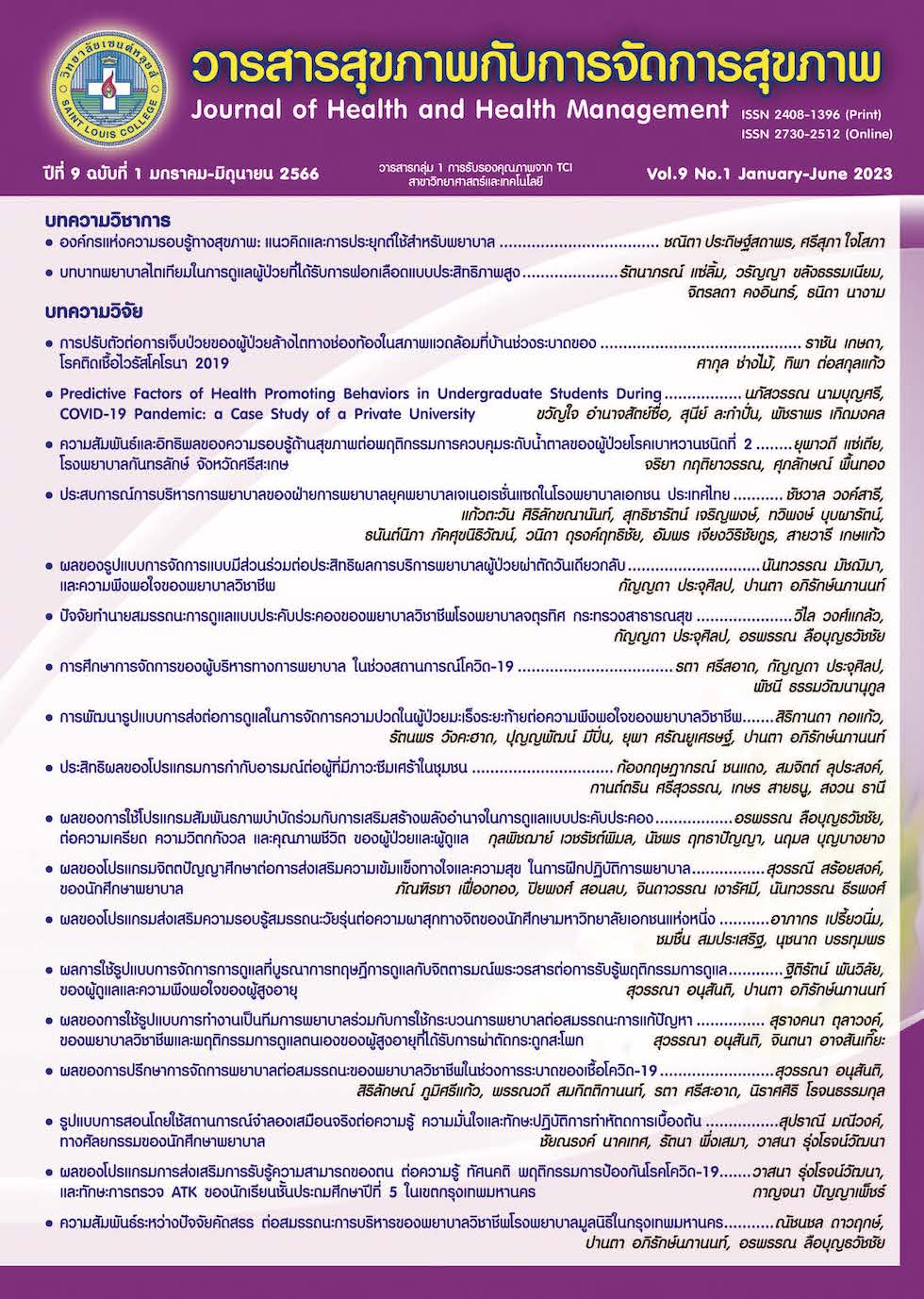Predictive Factors of Health Promoting Behaviors in Undergraduate Students During COVID-19 Pandemic: a Case Study of a Private University
Keywords:
Health Promoting Behaviors, Undergraduate students, COVID-19, Private UniversityAbstract
Although the COVID-19 pandemic can influence lifestyle changes in the general population, there is limited information on how undergraduate students adapt and change their lifestyles during the COVID-19 pandemic. An analytic-cross-sectional study investigated health-promoting behaviors and their predictive factors among undergraduate students in a private university in Thailand during the COVID-19 pandemic. A total of 200 undergraduate students from the School of Nursing Science, School of Architecture and Design, and School of Music participated in an electronic survey from December 2021 to February 2022. The results showed that most undergraduate students reported moderate levels of health-promoting behaviors (68%) with the highest mean of health responsibility. According to Pearson’s correlation coefficient, perceived benefit (r = .588, p < .01), self-efficacy (r = .545, p < .01), interpersonal influence (r = .540, p < .05), perceived barrier (r = .292, p < .01) and GPA (r = .164, p < .05) showed positive correlations with health-promoting behaviors among undergraduate students. However, stress (r = -.279, p < .01) and self-rated health status (r = -.342, p < .01) showed negative correlations with health-promoting behaviors. According to Multiple Regression Analysis, perceived benefit, interpersonal influence, self-efficacy, being a third-year student, history of closed contact with COVID-19, and self-rated health status could jointly explain 52.9% of health-promoting behaviors of undergraduate students during the COVID-19 pandemic. The results of this study suggest that a program to increase students’ self-efficacy, strengthen their interpersonal relationships and improve supportive facilities should be developed. The university’s policymakers should initiate a preparation program for students and university personnel to enhance their competency to improve health-promoting behaviors and respond to any new pandemic episodes in the future.
References
Alzahrani, S. H., Malik, A. A., Bashawri, J., Shaheen, S. A., Shaheen, M. M., Alsaib, A. A., ... & Abdulwassi, H. K. (2019). Health-promoting lifestyle profile and associated factors among medical students in a Saudi university. SAGE open medicine, 7, 1-7.
Department of disease control. (2021). Coronavirus-19 resilience, prevention, and control guildline. Retrieved from https://ddc.moph.go.th/uploads/publish/1150920210610033910.pdf
Hwang, Y., & Oh, J. (2020). Factors affecting health-promoting behaviors among nursing students. International Journal of Environmental Research and Public Health, 17(17), 1–13.
Kanjanapiboonwong, A., Kamwangsanga, P., & Keawta, S. (2020). NCDs report, diabetes mellitus, hypertension and related factors 2020. Retrieved from http://www.thaincd.com/2016/media-detail.php?id=13865&tid=&gid=1-015-005
Kaparounaki, C. K., Patsali, M. E., Mousa, D. P. V., Papadopoulou, E. V., Papadopoulou, K. K., & Fountoulakis, K. N. (2020). University students’ mental health amidst the COVID-19 quarantine in Greece. Psychiatry research, 290,(2019), 113111.
Laothamatas, A. (2021). Measures and Monitoring of COVID-19 spreading (No.18). Retrieved from https://www.mhesi.go.th/images/Pusit2021/pdfs/18-AnnCovid.pdf
Rakpanusit, T., Jeenmueng, N., & Khoyneung, N. (2018). Factors Related to Health Promoting Behavior among Undergraduate University Students, Prince of Songkla University, Pattani Campus. Academic Services Journal, Prince of Songkla University, 29(3), 170-178.
Di Renzo, L., Gualtieri, P., Pivari, F., Soldati, L., Attinà, A., Cinelli, G., ... & De Lorenzo, A. (2020). Eating habits and lifestyle changes during COVID-19 lockdown: an Italian survey. Journal of translational medicine, 18(1), 1-15.
Sabooteh, S., Feizi, A., Shekarchizadeh, P., Shahnazi, H., & Mostafavi, F. (2020). Effect of web-based and software-based educational intervention on stages of behavior change of students' physical activity. Journal of Education and Health Promotion, 9. doi: 10.4103/jehp.jehp_645_19
Sanasuttipun, W., & Nookong, A. (2015). Predictive Factors for Teenagers’ Exercise and Activity Behaviour. Thai Journal of Nursing Council, 30(2), 46-59.
Saravirote, A., & Janyam, K. (2014). Factors influencing health promotion behavior of undergraduate students at Prince of Songkla University, Hat Yai Campus. Kasetsart Journal of Social Sciences, 35(2), 223-234.
Silpakit, O. (2008). Srithanya Stress Scale. Journal of Mental Health of Thailand., 16(3). 177-185.
Subramanian, S. V., Huijts, T., & Avendano, M. (2010). Self-reported health assessments in the 2002 World Health Survey: how do they correlate with education?. Bulletin of the world health organization, 88(2), 131-138.
Suksatan, W., Choompunuch, B., Koontalay, A., Posai, V., & Abusafia, A. H. (2021). Predictors of health behaviors among undergraduate students during the COVID-19 pandemic: a cross-sectional predictive study. Journal of multidisciplinary healthcare, 14(2021),727-734.
Provisions in accordance with Article 9 of the Royal Decree on the Administration of Government in Emergency Situations B.E. 2548 (Vol. 20). (2021, April 16). Government Gazette. Pt. 138a Gnor, (Special Issue), p. 25-28
Walker, S. N., Sechrist, K. R., & Pender, N. J. (1995). Health Promotion Model - Instruments to Measure Health Promoting Lifestyle : Health-Promoting Lifestyle Profile [HPLP II] (Adult Version). Retrieved from https://deepblue.lib.umich.edu/handle/2027.42/85349
World Health Organization. (2020). Noncommunicable disease. Retrieved from https://www.who.int/news-room/fact-sheets/detail/noncommunicable-diseases
World Health Organization. (2021). Working for a brighter, healthier future How WHO improves health and promotes well-being for the world’s adolescents. Retrieved from https://www.who.int/publications/i/item/9789240041363
Yongstar, S. (2020). Coronavirus: When teaching must continue Is online classroom the answer? Retrieved from https://www.bbc.com/thai/thailand-51975231
Downloads
Published
How to Cite
Issue
Section
License
Copyright (c) 2023 Journal of health and health management

This work is licensed under a Creative Commons Attribution-NonCommercial-NoDerivatives 4.0 International License.




